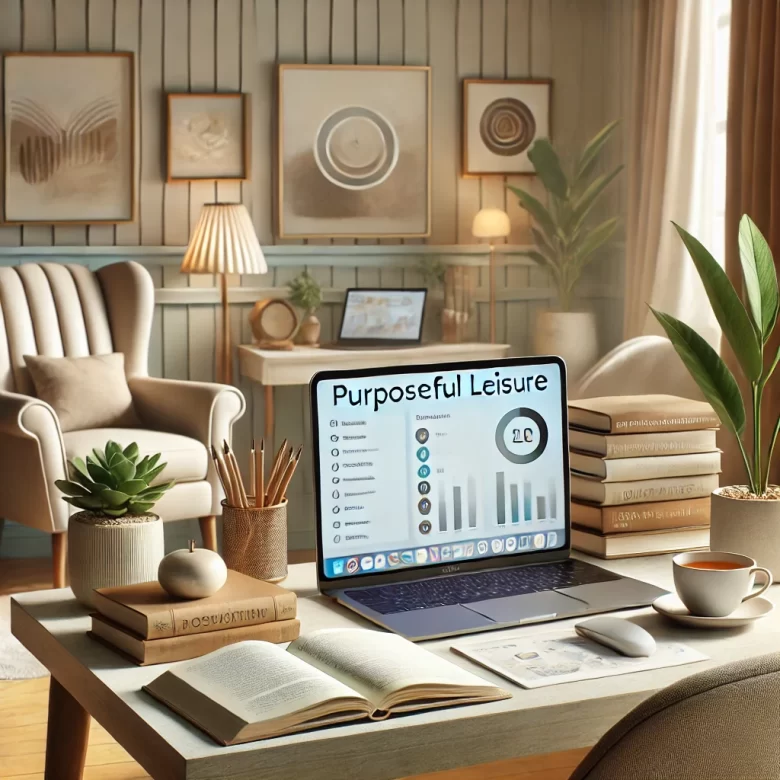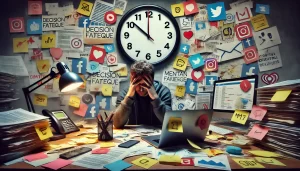In today’s fast-paced world, where work, technology, and other responsibilities can consume most of our day, it’s easy to forget the importance of leisure. Free time, when not properly organized, often gets wasted, leaving us feeling unsatisfied and stressed. Purposeful leisure is about making the most of your free time by engaging in activities that promote relaxation, creativity, and personal growth. By organizing your leisure activities intentionally, you can create a sense of fulfillment and enrich your life.
Purposeful leisure goes beyond just relaxing; it’s about doing what truly matters to you during your free time—whether that’s nurturing personal relationships, focusing on hobbies, or simply enjoying quiet moments. Organizing your leisure time effectively can boost your mental and physical well-being, increase your productivity, and give you a more balanced life. In this article, we’ll explore strategies for organizing your leisure activities, focusing on how to maximize your free time through prioritization, balancing activities, and aligning your hobbies and interests with your core values.
Understanding the Importance of Purposeful Leisure
Before diving into organizing your leisure activities, it’s important to understand why purposeful leisure matters. Leisure activities done with intention contribute far more to your well-being than mindlessly scrolling through social media or spending hours in front of a screen. Purposeful leisure helps to rejuvenate your mind and body while promoting personal growth.
Why Purposeful Leisure Matters
Engaging in leisure with purpose can lead to a sense of accomplishment and happiness, which passive activities often fail to provide. When you are intentional about your leisure time, you make conscious decisions about how to use that time, ensuring it enriches your life. This doesn’t just mean taking a break from work—it’s about reconnecting with yourself and doing what fuels your passions.
Research consistently shows that people who engage in meaningful leisure activities are happier and more fulfilled than those who simply rest without purpose. Purposeful leisure improves your mental health, helps you recharge, and increases your motivation for other aspects of your life. By carefully selecting the activities you engage in, you ensure that your free time supports your overall well-being rather than draining it.
Identify Your Personal Interests and Values
The first step in organizing purposeful leisure is identifying what truly matters to you. What activities make you feel energized, happy, and fulfilled? What are your core values, and how can your free time reflect them? Understanding these factors allows you to make deliberate choices about how to spend your time.
Reflect on Your Passions
Think about the activities that bring you joy and fulfillment. These are the pursuits that leave you feeling restored, inspired, and content. Whether it’s reading a book, playing music, hiking in nature, painting, or spending quality time with loved ones, these activities are the cornerstone of your meaningful leisure.
For example, if you love art, you might choose to spend your free time painting, visiting galleries, or taking a creative class. On the other hand, if fitness is important to you, spending your leisure time engaging in physical activities like cycling, jogging, or yoga would be a great way to maintain your health while nurturing your passions.
Align Your Leisure Activities with Your Values
Leisure time offers you a chance to reconnect with your values. Are you passionate about personal growth, health, creativity, or family? Aligning your leisure activities with your values ensures that your time off is fulfilling and worthwhile.
For instance, if you value personal growth, you might choose to spend your free time learning new skills, attending workshops, or reading books related to self-improvement. If spending time with family is important to you, prioritize activities like family dinners, weekend trips, or game nights. The more your leisure activities align with your values, the more fulfilling they will be.
Prioritize Your Free Time
To make the most of your free time, you need to be strategic about how you allocate it. Without a clear plan, free time can slip away without accomplishing anything meaningful. Prioritizing your leisure activities allows you to focus on the activities that matter most.
Create a Time Budget
Just like you create a financial budget to manage your money, you can create a “time budget” to make sure your free time is spent wisely. Begin by identifying how much free time you have each week, then allocate time for different activities. You might want to designate evenings for relaxation, weekends for outdoor adventures, or certain days for pursuing a hobby.
Creating a time budget ensures that you’re not only productive during the week but also making time for your personal interests. It helps you avoid the trap of mindlessly spending hours on non-productive activities like watching TV or browsing the internet. A time budget encourages you to be intentional with every moment of free time.
Set Boundaries with Work and Technology
In today’s digital world, work and technology can easily interfere with our leisure time. Setting clear boundaries is essential to ensure that your personal time remains uninterrupted. For example, you can set boundaries by not answering work emails or taking work calls during your time off. By doing so, you maintain a healthy separation between work and relaxation.
Technology, while useful, can also be a major distraction. Social media and other online platforms often steal valuable time that could be spent on activities that promote well-being. Setting limits on screen time, scheduling “phone-free” hours, and turning off notifications are great ways to keep distractions at bay and focus on the activities that matter most.
Embrace Variety in Your Leisure Activities
Variety is the spice of life, and it applies to your leisure time as well. Engaging in different types of activities will keep your free time exciting and refreshing. It helps to strike a balance between relaxation, creativity, physical activity, and socializing.
Balance Relaxation and Productivity
While relaxation is important, balancing it with activities that promote personal growth or productivity ensures that your leisure time is well-rounded. For instance, if you enjoy reading novels to unwind, you might balance that with learning a new skill or working on a creative project. Balancing relaxation with productivity ensures that you don’t feel guilty about taking breaks, while still making the most of your free time.
For example, after spending an hour watching your favorite show, you could engage in a productive activity like learning a new language or writing in a journal. This mix of relaxation and productivity ensures that you’re not only recharging but also progressing toward your personal goals.
Try New Activities
Exploring new hobbies or activities can help keep your free time fresh and exciting. Whether it’s taking up a new sport, learning a new instrument, or exploring new forms of art, trying new things can lead to a sense of accomplishment and personal growth. New experiences also broaden your horizons and prevent boredom from creeping in.
For example, if you’ve always wanted to learn how to cook or bake, taking a cooking class might be a fun and rewarding way to spend your free time. Learning something new not only challenges your mind but also adds variety to your routine, keeping your leisure activities engaging and dynamic.
Create Space for Socializing and Relationships
Leisure is not only about individual pursuits; it’s also about spending quality time with others. Relationships play a significant role in our emotional well-being, and socializing is a great way to nurture those relationships.
Schedule Time for Social Activities
With our busy schedules, it’s easy to let socializing fall by the wayside. However, scheduling time to connect with friends, family, or loved ones is essential for maintaining strong relationships. Whether it’s a weekly dinner with friends, a monthly family gathering, or a weekend outing, making time for social activities strengthens your social bonds and enhances your emotional health.
Planning social activities ensures that you maintain meaningful relationships, preventing isolation and loneliness. These connections provide support, joy, and a sense of belonging, making your leisure time more fulfilling.
Engage in Group Activities
Group activities like sports, volunteering, or group hobbies offer an excellent opportunity to bond with others while engaging in something fun and meaningful. These activities provide a sense of community and shared purpose, which enhances your social connections and adds value to your free time.
Whether it’s joining a fitness class, participating in a charity event, or taking part in a group hobby, group activities provide opportunities to meet new people and deepen existing relationships.
Plan for Rest and Recovery
Leisure time isn’t just about being productive or having fun—it’s also about rest and recovery. Taking time to relax and recharge is essential for maintaining both physical and mental health.
Incorporate Downtime into Your Schedule
It’s important to schedule downtime during your leisure time. Relaxation helps reduce stress, rejuvenates the mind, and improves overall well-being. Whether it’s through meditation, taking a nap, or simply enjoying quiet time, having moments of rest ensures that you remain energized for the activities that matter most.
Remember, downtime doesn’t mean doing nothing—it means giving yourself permission to slow down and let your mind and body recover.
Avoid Over-Scheduling
While it’s tempting to fill every moment of your free time with activities, over-scheduling can lead to burnout. It’s essential to allow yourself space for rest and reflection. Taking breaks between activities or spending some time doing absolutely nothing can recharge your mental batteries and improve your overall well-being.
Over-scheduling can diminish the quality of your leisure time. Instead of cramming your schedule, allow flexibility and room for spontaneity, where you can choose activities based on how you’re feeling at the moment.
Evaluate and Adjust Your Leisure Activities Regularly
Maximizing your leisure time is an ongoing process. As your life evolves, so should your leisure routine. Regularly evaluating how you spend your free time ensures that your activities still align with your goals and values.
Review Your Time Allocation
It’s a good idea to periodically assess how you spend your free time. Are you making time for activities that bring you joy and fulfillment? Are you balancing relaxation with productivity, or are you over-indulging in passive activities? Reviewing your leisure activities helps you make necessary adjustments and ensures that your free time is spent meaningfully.
Be Flexible
Your leisure activities should be flexible enough to accommodate changes in your life. Whether it’s new hobbies, a change in routine, or evolving interests, your approach to leisure should remain adaptable. This allows you to keep your free time fresh, dynamic, and aligned with your current needs.
Purposeful leisure is more than just filling time with random activities; it’s about making conscious choices that enrich your life, foster personal growth, and provide balance. By organizing your leisure time around your personal values, priorities, and interests, you can create a routine that maximizes both relaxation and productivity. Purposeful leisure not only enhances your mental and physical well-being but also allows you to cultivate meaningful relationships and personal growth. Maximize your free time, and you’ll find that your life becomes more fulfilling, balanced, and joyful.




